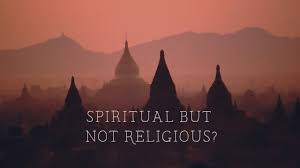
People as “Garbage”
In a speech about immigration, a prominent politician recently remarked that America has become “a dumping ground. We’re like a garbage can for the world.” And at a political rally, a comedian referred to Puerto Rico as “a floating island of garbage.”
I want to give them the benefit of the doubt. Did they mean that all immigrants are garbage, and that the residents of Puerto Rico are garbage? Or was the politician talking only about immigrants who lack proper papers and the comedian only that the island is messy? I don’t know.
But is speaking about any group of human beings in that manner OK? I think not. We may have different opinions about how the U.S. border should be handled but referring to any group of human beings in such a way, even those who are “illegal,” is an obstacle in the search for God. And Puerto Ricans are certainly not garbage.
Contradicts Christian Teachings
For starters, such a view contradicts my church’s teaching on social justice, and, as far as I know, the teaching of all major Christian denominations. My Catholic Church’s teaching on the subject has one solid base: human dignity, the view that all humans have a dignity that results from being children of God.
Your Catholic church, some might say, doesn’t have a particularly sterling record on the subject of human dignity. The historical persecution of its enemies, and the more recent findings of widespread clergy abuse of children, are examples of the violation of human dignity.
I can’t argue about that, except to say that the religious persecutions of the past were pretty much carried out by many, if not all, religions. The clergy abuse of children is harder to defend, though I believe the public perception is worse than the actuality.
The only solid research on the subject that I know about is from the 2011 study, The Causes and Context of Sexual Abuse of Minors by Catholic Priests in the United States, 1950-2010, by a research team at the John Jay College of Criminal Justice, which is part of the City University of New York. It found that about 4 percent of Catholic clergy – about the same proportion as the general population of American males – were accused of the sexual abuse of minors during that period.
Sign of Hypocrisy?
We have greater expectations for the clergy, of course, but I think the public perception is that the proportion is much higher. And they see the abuse as a sign of hypocrisy on the part of the Catholic Church.
So before continuing with the subject of human dignity, a word about hypocrisy – against which Jesus often raged. To me, hypocrisy isn’t the inability to live up to your own standards – something we all frequently fail to do – but the pretense of believing in those standards. And there’s no evidence that is principally the case for abusing priests.
I hope this isn’t viewed as downplaying the clergy abuse problem in the Catholic Church. It’s an attempt to put it into perspective. Such abuse makes me embarrassed and ashamed for my church. And it’s always the elephant in the room when talking about religious issues discussed in public. But does the clergy abuse crisis make the church’s teachings wrong? I don’t think so.
So, back to the subject of human beings as “garbage.” Here’s what the official Catholic Church in the U.S. says on the subject of human dignity, from the United States Council of Catholic Bishops.
Human Life Sacred
“The Catholic Church proclaims that human life is sacred and that the dignity of the human person is the foundation of a moral vision for society. This belief is the foundation of all the principles of our social teaching.
“We believe that every person is precious, that people are more important than things, and that the measure of every institution is whether it threatens or enhances the life and dignity of the human person.”
But before we start judging others – even the person who spoke of immigrants as garbage – what about all the classes of people we may secretly view that way. We live, as Pope Francis has said, in a “throwaway culture,” meaning that in our consumer-driven, materialistic and affluent culture, we depreciate food, the environment, and people.
In that sort of context, it’s not hard to see some other human beings as garbage.




